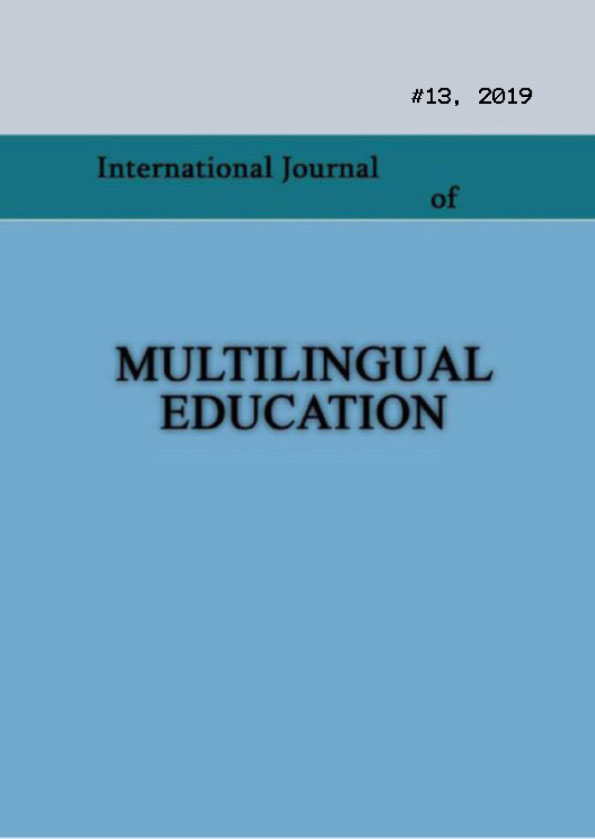Lexicology and Multilingualism
Keywords:
CLIL, multilingualism, bilingual education, multilingual education, multilingual competence, lexicology.Abstract
The article deals with the issues where multilingualism as a linguistic phenomenon is successfully revealed in the Lexicological studies, namely, in the five lexicological problematic questions of the course, and the whole topic is dedicated to the Multilingual aspect in Lexicology.
It covers the description of CLIL (Content Language Integrated Learning) and some aspects of its influence on the process of development of students’ multilingual competence. It is emphasized that multilingualism has become a widespread phenomenon in modern society. A considerable number of people speak more than two languages in their everyday life due to historical, social, or economic reasons. This is one of the causes why multilingual competence has been defined as one of the key competences that a modern competitive specialist should possess according to the European System of Higher Education. CLIL is usually thought to play an increasingly important part in language education, both as a feature of foreign teaching and learning, and as an element of bi- and multilingualism, that was evidently presented in the course of English Lexicology. The ability to apply multilingual competence is one of the key objectives of the curriculum. Multilingual competence presupposes that speakers use different languages for different contexts and purposes, but their influence on the languages may differ. The article gives a detailed description of the features typical of CLIL. So, subject learning combined with language learning leads to the formation of multilingual knowledge, which contributes to the development of multilingual competence.
References
Abello-Contesse, C. Et al, (2013). Abello-Contesse, C., Chandler, P., López-Giménez, M. D., & Chacón-Beltrán, R. (Eds.). Bilingual and multilingual education in the XXI century. Clevedon: Multilingual Matters.
Anisimova, A. (2017). Lexicology of Modern English: Theory and Practice. ДНІПРО: РВВДНУ Акцент ПП.
Baker, C. (2011). Foundation of Bilingual Education on Bilingualism (pp. 4-5). Bristol: Multilingual Matters.
Cenoz, J. and Gorter, D. (2011). A Holistic Approach to Multilingual Education: Introduction. Modern Language Journal 95, 3, 339-43.
Dalton-Puffer, Ch. (2011). Content-and-Language Integrated Learning: from Practice to
Principles?/Annual Review of Applied Linguistics, 31, 182-204.
James, A. (2000). English has European Lingua Franca: Current Realitiesand Existing
Dichotemies/English in Europe: The acquisition of the Third Language (pp. 22-38). Clevedon.
Jesenska,P. (2007). Eurospeak and ELF. English as a current global Lingua Franca. Topics in Linguistics, 62-67.
Kemp, C. (2009). Defining Multilingualism. The Exploration of Multilingualism, 11-26.
Knight, J. (1999). Internationalization of higher education. Quality of internationalization in higher education. Paris: OECD.
Lasagabaster, D. (2009). Language Attitudes in CLIL and Traditional EFL Classes. International Journal of CLIL Research, 1, 4-17.
Mehisto, P. (2008). Uncovering CLIL: Content and Language Integrated Learning in Bilingual and Multilingual Education. Oxford: MacMillan Education, Limited.
Truchot, C. (2004). Languages and supernationality in Europe: The linguistic influence of the European Union. Languages in a Globalizing World (pp 90-110). Cambridge
University Press.
Warren, J. & Benbow, H. (Eds.) (2008): Multilingual Europe: Reflections on Language and Identity. NewcastleuponTyne: CambridgeScholarsPublishing.
Wei, L. (2008). Perspectives on Bilingualism and Multilingualism. The Blackwell Guide to Research Methods in Bilingualism and Multilingualism (pp. 3-17). Oxford: Blackwell Publishing Ltd.
Wilton, A.(2011). The Dynamics of English in a Multilingual Europe. English in Europe Today: Sociocultural and Educational Perspectives (pp.1-13). Amsterdam.
Downloads
Published
How to Cite
Issue
Section
License
Copyright (c) 2019 Alla Anisimova

This work is licensed under a Creative Commons Attribution-NonCommercial 4.0 International License.
Copyright (c) - Authors who publish with this journal agree to the following terms: Authors retain copyright and grant the journal the right of first publication with the work simultaneously licensed under a Creative Commons Attribution-Noncommercial 4.0 International License, which allows others to share the work with an acknowledgement of the work's authorship and initial publication in this journal. Authors are permitted and encouraged to post their work online (e.g., in institutional repositories or on their personal website) prior to and during the submission process, as it can lead to productive exchanges, as well as earlier and greater citation of published work (see The Effect of Open Access). Authors may enter into separate, additional contractual arrangements for the non-exclusive distribution of the journal's published version of the work (e.g., post it to a repository or publish it in a book), with an acknowledgement of its initial publication in this journal.

